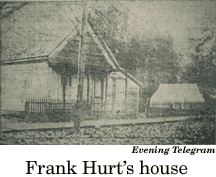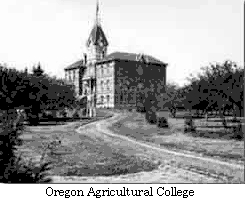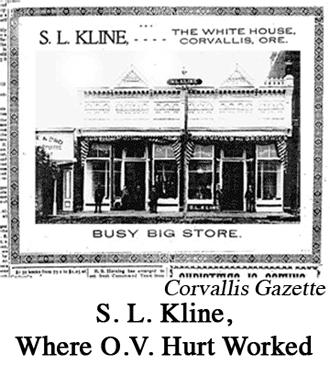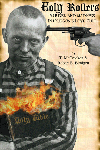When Franz Edmund Creffield gained notoriety in Corvallis in the early 1900s it was a small farming community in the heart of the Willamette Valley, the "Eden" at the end of the Oregon Trail. Thousands had came to the Oregon Territory for many reasons, but most came because there was the promise of land--free land that was productive beyond belief--preachers not being the only ones making astonishing claims. Peter Burnett, later governor of California, said: "Gentlemen, they do say, that out in Oregon the pigs are running about under the great acorn trees, round and fat, and already cooked, with knives and forks sticking in them so that you can cut off a slice whenever you are hungry."
 In
a town surrounded by forests, fields and orchards, people
lived in neat houses set in fairly well-kept grounds. Many
lived almost entirely upon what they raised themselves, and
everyone had a yard full of chickens. The streets were
adorned with shade trees, and every block had a barn or two
where people kept horses, and cows were staked on vacant
lots-- ordinances had recently been passed that prohibited
allowing pigs and horses to run at large, and cattle to roam
the streets at night.
In
a town surrounded by forests, fields and orchards, people
lived in neat houses set in fairly well-kept grounds. Many
lived almost entirely upon what they raised themselves, and
everyone had a yard full of chickens. The streets were
adorned with shade trees, and every block had a barn or two
where people kept horses, and cows were staked on vacant
lots-- ordinances had recently been passed that prohibited
allowing pigs and horses to run at large, and cattle to roam
the streets at night.
Oregon Agricultural College, a small land-grant college, was situated on land donated by the town's 3,000 citizens. The yearbook, The Hayseed, described the school as "preeminently a college for the working classes. . . . It is for those who come from, and who expect to engage in, the active pursuits of an industrial life that the institution draws the largest share of its patronage."
In her book, Corvallis In 1900, Minerva Kiger Reynolds describes people leading very orderly lives.
Mondays, she said, were wash days. Clothes were boiled on wood stoves in large boilers, rinsed in tubs of water, blued, starched, and pinned on the line to dry.
Tuesdays were ironing days. By 1906 flat irons with detachable handles were replacing old irons that were welded in one piece and required a cloth pad to hold the hot handle. The irons, still very heavy, were heated on a stove top, and as one iron cooled it was returned to the stove and exchanged for a hot one.
Wednesdays were for cleaning and doing odd jobs about the house, including mending clothes and darning socks.
Thursdays were visiting days. Women dressed in their best and made formal calls upon friends. If a friend called upon was not at home, a calling card was slipped under the front door.
Fridays were housecleaning days.
Saturdays were baking days. In the summer, farmers sold fruits and vegetables in town, driving wagons through the streets and announcing their presence by ringing bells. Horseradish Billy, using a little two-wheeled cart, went house to house with his five-gallon stone crock of horseradish. If a woman didn't buy any, Billy still gave her enough for dinner that night.
On Sundays, of course, people went to church. There were nine churches in Corvallis: Catholic, Presbyterian, Baptist, Congregational, Christian, Episcopal, Evangelical, and two Methodist churches.
Fraternal organizations flourished in Corvallis--the most prominent, the Oddfellows, the Masons, the United Workmen and the Good Templars. The Good Templars, a temperance organization, was the only society that allowed women to become members. The women of Corvallis had the "Coffee Club," which served nonalcoholic refreshments to the fire company and others at fires.
There were three saloons in town and some men, usually unmarried ones, patronized them far more than was to the liking of many in Corvallis. Generally, however, after men married and had families to support, they didn't have money for liquor and drank much less--or stopped drinking entirely. Police officers knew who the drinkers were, and watched them closely.
The Corvallis Opera House was not what most would now think of as an opera house. Besides providing a stage for traveling stock companies, the Opera House hosted parties, graduation exercises, and basketball games. Once a couple who had recently moved to Corvallis from San Francisco created considerable amusement when they arrived at the theater in formal attire--the woman, adorned with diamond-studded jewelry, was dressed in a white satin evening gown with a short train, and her husband wore a silk stovepipe hat and a swallowtail coat.
The stores in Corvallis remained open until nine o'clock at night, and many men would go downtown to the barber shop, the pool hall, or the hardware store to discuss the day's events. They gathered around wood stoves, gossiped, told jokes, and spat tobacco juice into big brass spittoons. At nine o'clock a curfew bell rang and children hurried home, usually closely followed by their parents.
 William
Dean Howells, describing how life in the New World was more
wholesome than in the decadent Old World, could have been
describing Corvallis in 1901: "Gentlemen no longer swear or
fall drunk under the table, or abduct young ladies and shut
them up in lonely country houses, or so habitually set about
to ruin their neighbors' wives as they once did. Generally,
people now call a spade an agricultural instrument; they
have not grown decent without having grown a little
squeamish; but they have grown comparatively decent; there
is no doubt of that."
William
Dean Howells, describing how life in the New World was more
wholesome than in the decadent Old World, could have been
describing Corvallis in 1901: "Gentlemen no longer swear or
fall drunk under the table, or abduct young ladies and shut
them up in lonely country houses, or so habitually set about
to ruin their neighbors' wives as they once did. Generally,
people now call a spade an agricultural instrument; they
have not grown decent without having grown a little
squeamish; but they have grown comparatively decent; there
is no doubt of that."
Everybody knew everything about everyone else in town--the two papers, the Corvallis Times and the Corvallis Gazette, made sure of that. The Times even had a regular section titled "Local Lore. News of Corvallis and Vicinity Told in Brief. The comings and Goings of People, Social Gossip, Personal Mention and Other Items of Public Interest." Everything was reported. Everything!
- Go out of town--it was reported.
- "The Gazette man is indebted to J. K. Berry for his first spin in an automobile," the Gazette reported on August 7, 1903 "He didn't ride far. The ethics of his profession do not permit of enjoyment to the point of satiety. But the exhilaration; the pulse quickening strange sensation of even a short excursion on an Oldsmobile machine beats the tintinnabulation of the sleigh bells and the--see how easy it is to lapse into poetry when there's inspiration."
- Come back to town--it was reported.
- "Clarence Starr returned home Tuesday
from Seaside, Oregon," the Gazette reported on
November 1, 1901, "where he had been employed for several
months in a sawmill. He relates an amusing story at the
expense of the little pumpkin vine railroad that runs
from Warrenton to Seaside. While en route home, traveling
over this line, the train slowed down, that is, it went
slower than usual and the whistle was repeatedly blown in
vain efforts to 'shoo' a cow off the track. It seemed
impossible to make her give the right of way and a
wearied passenger finally agreed to give her a start,
which he did. She seemed quite alarmed at the
demonstrations of the passenger and, throwing her tail to
the breeze, continued her way on down the track at her
liveliest gait. The passenger climbed back onto the
'whole train' and the engine was turned loose to make up
for the time lost. After about half an hour's run the
train again slowed down and the shrill whistle resounded
along the coast. The passenger inquired what was the
matter now. He was answered by the conductor who stated
that they had caught up with the cow."
Have a good day at work--it was reported.
- "Frank Hurt is reported to be doing exceedingly well in his position as shipping clerk at Ainsworth dock, Portland, the Gazette reported on December 3, 1901. "A few days ago he checked a China steamer in and out. This is quite an undertaking and requires considerable knowledge and great accuracy. He is well spoken of by his employers."
- Have a bad day at work--it was reported.
 "It
was not a cyclone or a cattle stampede, though not many
of the symptoms were lacking,"the Times reported
on May 29, 1901. "It happened in Kline's store Saturday
evening. The employees were boxing eggs for shipment.
Victor Hurt stooped over an egg case and rummaged in the
bottom, when a big rat ran up his arm on his shoulder,
brandishing his tail in his face. Hurt, convinced that it
was the panther reported at large west of town, fell over
himself in terror and set up a commotion that brought all
employees to the scene. Armed with brooms, pocket shears
and bars of soap the boys began a chase that finally
ended with the death of the rat just outside the front
door. The only hurt sustained in the incident was by
Hurt, whose nerves were so hurt that he still sees rats
in every old box about the store."
"It
was not a cyclone or a cattle stampede, though not many
of the symptoms were lacking,"the Times reported
on May 29, 1901. "It happened in Kline's store Saturday
evening. The employees were boxing eggs for shipment.
Victor Hurt stooped over an egg case and rummaged in the
bottom, when a big rat ran up his arm on his shoulder,
brandishing his tail in his face. Hurt, convinced that it
was the panther reported at large west of town, fell over
himself in terror and set up a commotion that brought all
employees to the scene. Armed with brooms, pocket shears
and bars of soap the boys began a chase that finally
ended with the death of the rat just outside the front
door. The only hurt sustained in the incident was by
Hurt, whose nerves were so hurt that he still sees rats
in every old box about the store."
Sometimes the most exciting items in the paper could be found in the church notes:
- "Unearthed! "the Gazette reported on January 5, 1900. "Exposed! Made public! Terrible tragedy! Full details! Names given! A blood stained bag! Ghastly contents to be exposed Saturday night 8 o'clock at the Salvation Army Hall, January 6th. Full particulars of greatest crime ever made public. All are welcome."
Despite having had its share of disasters, acts of God such as floods and fires, Corvallis was a good place to live and raise a family--until Creffield brought "pestilence" upon it. The crime that Creffield committed in Corvallis was thought to be one of the greatest--if not the greatest--crimes ever made public in the city's history. At the time the papers dutifully followed and printed the details of this crime. Secrets were unearthed. Private lives were exposed. All of it was made public. Names were named. Reputations were stained. It was a terrible tragedy.
And every time people thought it couldn't get any worse, it did.
Chapters from
Holy Rollers: Murder & Madness in Oregon's Love Cult
Part 1: The Seduction
Chapter 1: Trust Me, Brothers And Sisters
(Life Before Creffield [B.C.])
Chapter 2: God, Save Us From Compromising Preachers
(Creffield's Preachings)
Chapter 3: The Flock
(Profiles of the Holy Rollers Were)
Chapter 4: The Holy Rollers
(Things Start to Get Wild on on Kiger Island)
Chapter 5: Housecleaning
(There's a Sacrificial Bonfire)
Chapter 6: Community Concerns
(Officers Visit)
Chapter 7: Esther, The Chosen One
(Creffield Plans to Marry 16-Year- Old)
Chapter 8: Tar and Feathers
(The Men of Corvallis Act)
Chapter 9: Sane People Don’t Go Bareheaded
(Holy Rollers are Committed to the Asylum)
Chapter 10: More Beast Than Man
( Creffield is Arrested)
Chapter 11: God Will Plead Creffield's Case
(Creffield in Court)
Chapter 12: Scandal
(Shocking Testimony at the Trial)
Chapter 13: Calm Before the Storm
(The Holy Rollers Resume their Lives)
Chapter 14: Giving Up The Ghost
(Men are Gunning for Creffield)
Part Two: The People V. Creffield
Chapter 16: The Widow Creffield
Chapter 19: An Inherited Streak of Insanity
Part Three: The Madness
Chapter 23: Seeking Reconciliation
Chapter 24: Another Holy Roller Page One Murder
Chapter 25: What Can Papa Do For You?
Chapter 26: Human Life is Too Cheap In This Community
Chapter 30: The Final Chapter
(What Happened to Everyone Afterwards)
The Epilogue
(Heaven's Gate)
Newspaper Articles from 1897-1903: Local Lore, News Of Corvallis and Vicinity Told in Brief B. C. (Before Creffield
